高中英语倒装句语法知识汇总7466
高一倒装句相关知识点
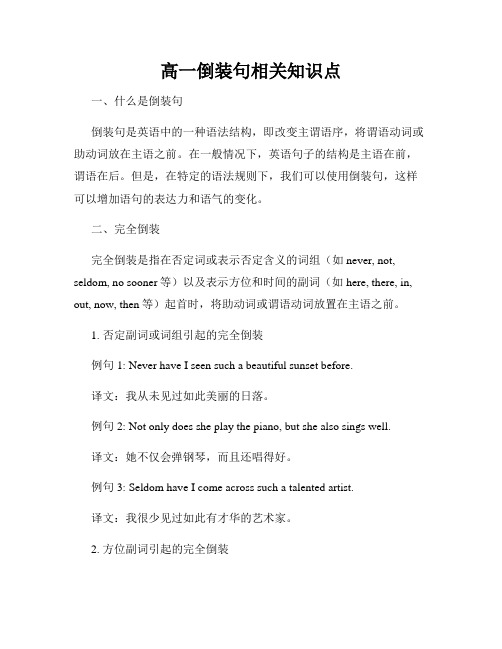
高一倒装句相关知识点一、什么是倒装句倒装句是英语中的一种语法结构,即改变主谓语序,将谓语动词或助动词放在主语之前。
在一般情况下,英语句子的结构是主语在前,谓语在后。
但是,在特定的语法规则下,我们可以使用倒装句,这样可以增加语句的表达力和语气的变化。
二、完全倒装完全倒装是指在否定词或表示否定含义的词组(如never, not, seldom, no sooner等)以及表示方位和时间的副词(如here, there, in, out, now, then等)起首时,将助动词或谓语动词放置在主语之前。
1. 否定副词或词组引起的完全倒装例句1: Never have I seen such a beautiful sunset before.译文:我从未见过如此美丽的日落。
例句2: Not only does she play the piano, but she also sings well.译文:她不仅会弹钢琴,而且还唱得好。
例句3: Seldom have I come across such a talented artist.译文:我很少见过如此有才华的艺术家。
2. 方位副词引起的完全倒装例句4: Up the street ran the little boy, desperate to catch the ice cream truck.译文:小男孩沿着街道跑去,拼命想赶上那辆冰淇淋车。
例句5: Out rushed the students as soon as the school bell rang.译文:一响起学校的铃声,学生们就冲了出去。
三、部分倒装部分倒装是指在特定的情况下,将助动词、情态动词或一些特殊谓语动词放在主语之前。
这种倒装在陈述句、特殊疑问句和祈使句中均有使用。
1. 在以否定副词或词组开头的陈述句中例句6: He never comes to class late.译文:他从不上课迟到。
高中英语倒装句的归纳总结

高中英语倒装句的归纳总结倒装句是英语中的一种特殊语法结构,通常在句子中,主语和谓语动词的位置是固定的,即主语在前,谓语动词在后。
然而,在某些情况下,为了强调句子中的某个成分,或者为了满足特定的语法要求,我们需要将主语和谓语动词的位置颠倒,这就是倒装句。
倒装句在高中英语中经常出现,因此对其进行归纳总结具有重要的意义。
一、全部倒装全部倒装是指句子中的主语和谓语动词完全颠倒的情况,常见于以下几种情况:1. 在以副词here, there或者out, in等表示地点的副词开始的句子中,常常采用全部倒装。
Here comes the bus.(汽车来了。
)There goes the bell.(铃声响了。
)Out rushed the children.(孩子们冲了出去。
)2. 在以表示方向的副词和介词短语开头的句子中,常采用全部倒装。
Down went the sun.(太阳下山了。
)In came the teacher.(老师进来了。
)3. 在以表示否定意义的副词或副词短语开头的句子中,常采用全部倒装。
Never have I seen such a beautiful view.(我从未见过如此美景。
)Not only does he play basketball, but he also plays football.(他不仅打篮球,还踢足球。
)二、部分倒装部分倒装是指只将谓语动词和助动词或情态动词提到主语之前,而将其他成分保持原来顺序的情况。
常见的部分倒装有以下几种情况:1. 在以表示否定意义的副词或副词短语位于句首时,动词与主语之间采用部分倒装。
Never have I been to Paris.(我从未去过巴黎。
)Hardly had she finished her speech when they clapped.(她刚刚讲完演讲就被他们鼓掌了。
)2. 在以so和neither引导的倒装句中,动词与主语之间采用部分倒装。
高中英语语法倒装总结全
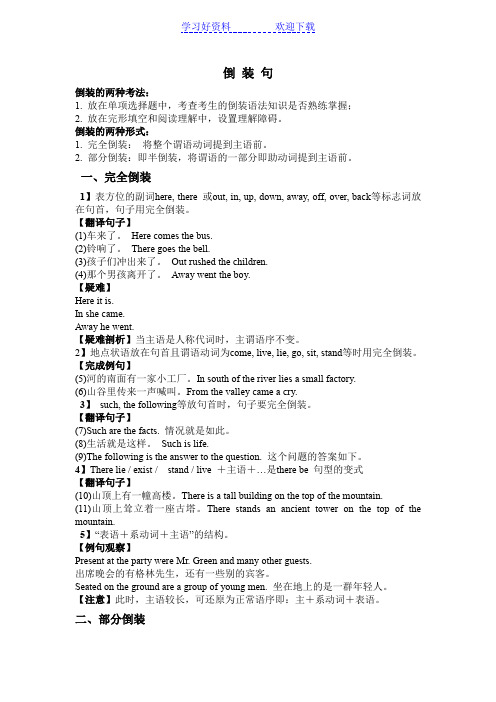
倒装句倒装的两种考法:1. 放在单项选择题中,考查考生的倒装语法知识是否熟练掌握;2. 放在完形填空和阅读理解中,设置理解障碍。
倒装的两种形式:1. 完全倒装:将整个谓语动词提到主语前。
2. 部分倒装:即半倒装,将谓语的一部分即助动词提到主语前。
一、完全倒装1】表方位的副词here, there 或out, in, up, down, away, off, over, back等标志词放在句首,句子用完全倒装。
【翻译句子】(1)车来了。
Here comes the bus.(2)铃响了。
There goes the bell.(3)孩子们冲出来了。
Out rushed the children.(4)那个男孩离开了。
Away went the boy.【疑难】Here it is.In she came.Away he went.【疑难剖析】当主语是人称代词时,主谓语序不变。
2】地点状语放在句首且谓语动词为come, live, lie, go, sit, stand等时用完全倒装。
【完成例句】(5)河的南面有一家小工厂。
In south of the river lies a small factory.(6)山谷里传来一声喊叫。
From the valley came a cry.3】such, the following等放句首时,句子要完全倒装。
【翻译句子】(7)Such are the facts. 情况就是如此。
(8)生活就是这样。
Such is life.(9)The following is the answer to the question. 这个问题的答案如下。
4】There lie / exist / stand / live +主语+…是there be 句型的变式【翻译句子】(10)山顶上有一幢高楼。
There is a tall building on the top of the mountain.(11)山顶上耸立着一座古塔。
高中英语语法倒装句总结讲解

高中英语语法倒装句总结讲解1. 完全倒装:即将谓语动词的全部置于主语之前。
常见用法:1) 当here, there, in, ou t, up, down, on 等副词置于句首,且主语为名词时;2) 将表示地点、方位的介词短语置于句首;3) 直接引语置于句首,其后的主语是名词时。
2. 部分倒装:即将谓语动词的一部分置于主语之前(如助动词be, do, have, will,和情态动词may, can, must, should 等)。
常见用法:1) 否定词或词组,如neither, nor, never, nowhere, not, seldom, rarely, scarcely, barely, hardly, no sooner, at no time, in no case, in no way, by no means, on no condition 等置于句首时;2) so 表示“也”,neither/ nor表示“也不”;so / such… that 表示“那样……以至于”置于句首时;3) only + 状语/ 状从,置于句首时, 主句要部分倒装;注意:当only + 主语置于句首时,则用正常语序。
4) not only … but also…引导两个分句时,not only 引导的分句要部分倒装;5) not until + 状语/ 状从,“直到……才”,置于句首时,主句要部分倒装;6) adj. / adv. / n. / v. / 分词+ as / though + 主语+ 谓语:引导让步状从,置于句首时;7) 在虚拟语气的条件句中,如含should, had, were, 可将它们置于句首,且省略if;8) 用于:May + 主语+ v. 结构中,表示“祝愿”;9) 表示次数、频率的副词置于句首时(也可用正常语序)。
倒装句口诀:副词开头要例装,人称代词则如常。
only修饰副介状,位于句首半倒装。
倒装句语法知识点归纳总结
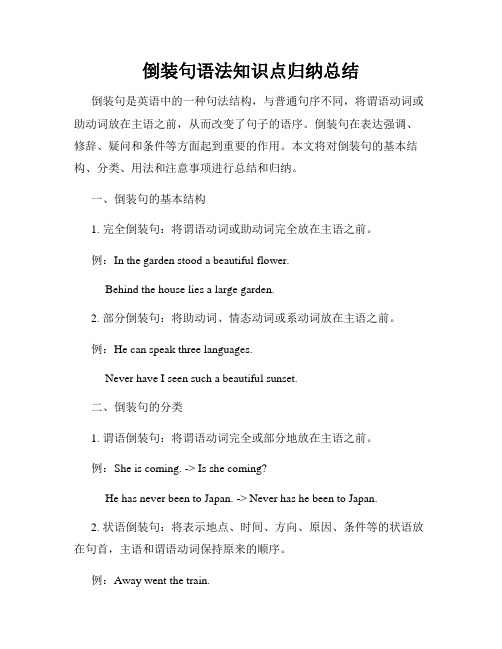
倒装句语法知识点归纳总结倒装句是英语中的一种句法结构,与普通句序不同,将谓语动词或助动词放在主语之前,从而改变了句子的语序。
倒装句在表达强调、修辞、疑问和条件等方面起到重要的作用。
本文将对倒装句的基本结构、分类、用法和注意事项进行总结和归纳。
一、倒装句的基本结构1. 完全倒装句:将谓语动词或助动词完全放在主语之前。
例:In the garden stood a beautiful flower.Behind the house lies a large garden.2. 部分倒装句:将助动词、情态动词或系动词放在主语之前。
例:He can speak three languages.Never have I seen such a beautiful sunset.二、倒装句的分类1. 谓语倒装句:将谓语动词完全或部分地放在主语之前。
例:She is coming. -> Is she coming?He has never been to Japan. -> Never has he been to Japan.2. 状语倒装句:将表示地点、时间、方向、原因、条件等的状语放在句首,主语和谓语动词保持原来的顺序。
例:Away went the train.In the distance could be seen a tall tower.3. 主从倒装句:主句和从句中的主语-谓语结构进行倒装。
例:Not until she finished her homework did she go to bed.Only when the rain stopped could we go outside.三、倒装句的用法1. 强调句:通过倒装句,可以将句子的某一部分进行强调,常用的结构是完全倒装句和部分倒装句。
例:Not only did he win the game, but he also broke the record.Under no circumstances should you touch the red button.2. 疑问句:直接将谓语动词或助动词放在主语之前形成疑问句。
高一英语倒装句语法知识点

高一英语倒装句语法知识点在英语语法中,倒装句是一种常见的句法结构,它可以增加句子的表达强度和语气的修饰。
倒装句的用法多种多样,下面将逐一介绍一些常见的倒装句语法知识点。
1. 完全倒装完全倒装是指助动词或者情态动词出现在主语之前,形成“助动词/情态动词 + 主语 + 谓语”的句子结构。
例如:Not only has he finished his homework, but he has also cleaned the entire room.这个句子中,“has he finished his homework”就是一个完全倒装结构,通过倒装强调了完成作业的重要性。
2. 部分倒装部分倒装是指将助动词或情态动词提到主语之前,形成“助动词/情态动词 + 主语 + 谓语”的结构。
与完全倒装不同的是,部分倒装并不需要完全倒装,只需要将助动词或情态动词提前即可。
例如:Never have I seen such a beautiful sunset.这个句子中,“have I seen such a beautiful sunset”是一个部分倒装结构,通过倒装表达了作者从未见过如此美丽的日落的强烈情感。
3. 省略倒装省略倒装是指在条件句或者让步句中,将if或though引导的从句中的主语和助动词省略,并把主语和助动词置于句首。
例如:Had I known you were coming, I would have prepared a meal for you.这个句子中,“Had I known you were coming”是一个省略倒装结构,通过倒装表达了如果我早知道你要来,我就会为你准备饭菜。
4. 祈使句倒装在祈使句中,常常使用倒装结构以增强命令或请求的语气。
与一般疑问句相比,祈使句的倒装结构很简单,只需要将动词提前至句首。
例如:Stop talking!这个句子中,“Stop talking”就是一个祈使句的倒装结构,通过倒装强调了停止讲话的命令性。
高中英语知识点归纳倒装句的用法

高中英语知识点归纳倒装句的用法倒装句是英语中的一种常见语法现象,它与一般的语序有所不同。
在倒装句中,谓语动词不再位于句子的中间,而是移到主语之前或状语之前,这种语法结构的运用可以使句子显得更加生动有趣。
下面将对高中英语中常见的倒装句进行归纳总结。
一、完全倒装句完全倒装句是指将助动词、情态动词或系动词放在主语之前,句子的谓语动词则位于主语之后。
完全倒装句的结构为:助动词/情态动词/系动词+主语+谓语动词+其他。
1.助动词完全倒装句助动词包括be动词、have动词和do动词。
当句子以副词here、there或表示方向的副词(如up、down、in、out等)开头时,为了突出地点或方向,可以采用助动词完全倒装的形式。
例如:Here comes the bus.There is a cat under the table.Down came the rain.2.情态动词完全倒装句情态动词包括can、could、may、might、must、shall、should、will、would等。
在表示祝愿、建议、命令等意义时,可以采用完全倒装的形式。
例如:May you have a happy birthday!Should you need any help, feel free to ask.Will you please close the door?3.系动词完全倒装句系动词包括be动词、seem、appear、look、sound等。
在表示位置、方式、状态、主语特征等方面时,可以采用系动词完全倒装的形式。
例如:On the table lies a book.How beautiful the flowers are!Tired as he was, he kept working.二、部分倒装句部分倒装句是指将谓语动词的一部分(通常是助动词或情态动词)与主语之间的位置对调,这种语法结构常见于否定句、选择疑问句和以感叹词开头的句子。
高中英语倒装用法归纳

高中英语倒装用法归纳倒装句是英语中一种常见的句法结构,它与正常的语序相比有所不同,一般将谓语动词或助动词放在主语之前,以强调句子的某个部分或改变句子的语气。
在高中英语中,倒装句的用法较为常见,今天我们就来归纳一下高中英语中的倒装用法。
一、完全倒装1. 在句首置于否定副词“never, seldom, hardly, rarely, little, barely, scarcely”之后,用于表示否定意义的完全倒装。
例如:Never have I seen such a breathtaking view.Seldom does she stay up late.Hardly had I started reading the book when the power went out.2. 在表示地点、时间或方式的副词或短语位于句首时,用完全倒装。
例如:In the garden were beautiful flowers and green trees.At the party came a lot of guests.In the distance can be seen the outline of a mountain.二、部分倒装1. 在以“here, there, now, then”开头的句子中,用部分倒装。
例如:Here comes the bus.There goes the bell.Now is the time for action.Then came the news that we had won.2. 当表示“only, so, nor, neither”等否定意义的词语位于句首时,用部分倒装。
例如:Only in this way can we achieve success.So angry was he that he couldn't speak.Nor did I see any familiar faces in the crowd.Neither have I read the book.3. 当以“never, seldom, rarely”等词作为修饰性状语位于句首时,也可用部分倒装。
高中英语倒装句语法知识汇总

高中英语倒装句语法知识汇总-CAL-FENGHAI-(2020YEAR-YICAI)_JINGBIAN高中英语倒装句倒装句分为全部倒装和部分倒装1 全部倒装全部倒装是只将句子中的谓语动词全部置于主语之前。
此结构通常只用于一般现在时和一般过去时。
常见的结构有:1) here, there, now, then, thus等副词置于句首, 谓语动词常用be, come, go, lie, run等表示来去或状态的动词。
Then came the chairman. 那时总裁来了。
Here is your letter. 你的信。
2)表示运动方向的副词或地点状语置于句首,谓语表示运动的动词。
Out rushed a missile from under the bomber. 轰炸机肚底下窜出一枚导弹。
Ahead sat an old woman. 前面坐着一个老妪。
注意:上述全部倒装的句型结构的主语必须是名词,如果主语是人称代词则不能完全倒装。
Here he comes. 他来了。
Away they went. 他们走开了。
2 部分倒装部分倒装是指将谓语的一部分如助动词或情态倒装至主语之前。
如果句子的谓语没有助动词或情态动词,则需添加助动词do, does或did,并将其置于主语之前。
1.句首为否定或半否定的词语,如no, not, never, seldom, little, hardly, at no time决不, in no way, not until…等。
Never have I seen such a performance. 从未见过如此糟糕的表演。
Nowhere will you find the answer to this question. 无论如何你不会找到这个问题的答案的。
Not until the child fell asleep did the mother leave the room. 母亲一直到孩子入睡后离开房间。
高中英语(倒装句)

高中英语语法——倒装句一、完全倒装(full inversion)——谓语部分完全放在主语之前1. there be 句型属于完全倒装Be可以换成“stand、live、exist、lie、remain、seem、appear”2. 副词,介词放在句首,且主语是名词Here、now、then、out、in、up、down、away、behind、under、+come、follow、fall、exist、lie、go、remain、run、+主语3. 表语前置倒装形容词、分词、介词短语、such、+be+主语二、部分倒装(partial inversion)——be、助动词、情态动词放在主语之前1. only修饰副词、介词、或状语从句放句首,主句部分倒装2. 否定词、表示否定意义的短语放句首,部分倒装。
Never、nor、not、hardly、little、seldom、scarcely、rarely;at no time、in no case、by no means、on no condition、under/in no circumstance3. 固定句型①so+be、情态动词、助动词+主语=It is/was the same with;so it is/was with…也是如此②neither/nor+be、情态动词、助动词+主语=…也不这样③So+adj./adv.+助动词+主语+动词+that 如此…以至于…Such+(a/an+)adj.+n.+助+主+动词that…④Neither 助+主+动词…,nor +助+主+动词…⑤Not only +倒装,but also 正常.⑥Not until…+主句部分倒装三、形式倒装(formal inversion)——强调部分提前,主谓并不倒装1. 感叹句What a/an +形容词+名词+主语+谓语!How 形容词+a/an+名词+主语+谓语!How 形容词/副词+主语+谓语!2. the more…,the more….The harder you work,the greater progress you have.3. however/whatever 引导的让步状语从句However difficult the problem may be,we must work it out this evening。
倒装句的用法 归纳型的

倒装句的用法归纳型的1、倒装句的定义倒装句是一种将句子中的某些成分(如主语、谓语、宾语、状语等)的位置进行颠倒的句式,以达到强调、平衡句子结构或满足特定表达需要的目的。
11 完全倒装完全倒装是指将整个谓语动词置于主语之前。
111 表示地点、方位的副词或介词短语位于句首时,句子采用完全倒装。
例如:“Here comes the bus” (公共汽车来了。
)“In front of the house stands a tall tree” (房子前面有一棵大树。
)112 表示时间的副词位于句首时,句子采用完全倒装。
如:“Now comes your turn” (现在轮到你了。
)12 部分倒装部分倒装是指将助动词、情态动词或系动词置于主语之前。
121 否定副词或短语位于句首时,句子采用部分倒装。
常见的否定词有:never, seldom, hardly, little, not until 等。
例如:“Never have I seen such a beautiful place” (我从未见过如此美丽的地方。
)“Not until he came back di d I know the truth” (直到他回来我才知道真相。
)122 “so +助动词/情态动词/系动词+主语”表示前面所说的情况也适用于另一人或物。
如:“He likes music So do I” (他喜欢音乐,我也喜欢。
)123 “neither/nor +助动词/情态动词/系动词+主语”表示前面的否定情况也适用于另一人或物。
例如:“I don't like coffee Neither/Nor does she” (我不喜欢咖啡,她也不喜欢。
)124 only 位于句首修饰状语时,句子采用部分倒装。
例如:“Only in this way can you learn English well” (只有通过这种方式你才能学好英语。
高中英语语法:特殊句式 之倒装句
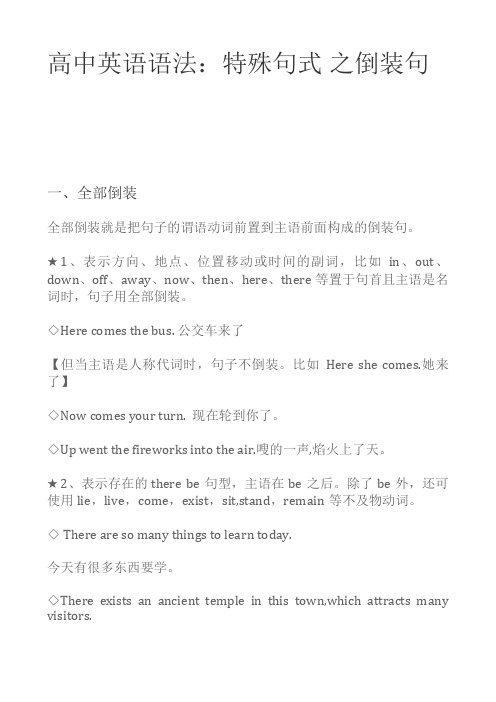
高中英语语法:特殊句式之倒装句一、全部倒装全部倒装就是把句子的谓语动词前置到主语前面构成的倒装句。
★1、表示方向、地点、位置移动或时间的副词,比如in、out、down、off、away、now、then、here、there等置于句首且主语是名词时,句子用全部倒装。
◇Here comes the bus. 公交车来了【但当主语是人称代词时,句子不倒装。
比如Here she comes.她来了】◇Now comes your turn. 现在轮到你了。
◇Up went the fireworks into the air.嗖的一声,焰火上了天。
★2、表示存在的there be句型,主语在be之后。
除了be外,还可使用lie,live,come,exist,sit,stand,remain等不及物动词。
◇ There are so many things to learn today.今天有很多东西要学。
◇There exists an ancient temple in this town,which attracts many visitors.这个镇上有一个古代庙宇,吸引着许多游客。
3、介词短语放在句首作状语,谓语动词是lie, stand , sit ,exist , stretch , come等或系动词be,主语是名词时。
◇At the foot of the mountain lies a clean stream.山脚下有一条清澈的小溪。
4、代词such放在句首,句子的谓语动词是be。
◇Such is what he wanted.这就是他想要的。
5、为了保持句子平衡,使上下文紧密街接,常将表语和状语放在句首,引起主语和谓语的倒装。
◇Gone are the days when we used foreign oil.我们用“洋油”的时代一去不复返了6、现在分词、过去分词、形容词、副词等有时可移到句首,来对动作或状态加以强调。
高三英语倒装句知识点
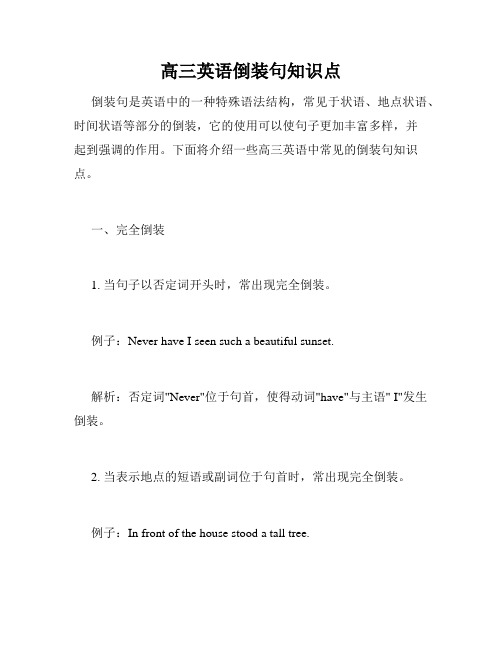
高三英语倒装句知识点倒装句是英语中的一种特殊语法结构,常见于状语、地点状语、时间状语等部分的倒装,它的使用可以使句子更加丰富多样,并起到强调的作用。
下面将介绍一些高三英语中常见的倒装句知识点。
一、完全倒装1. 当句子以否定词开头时,常出现完全倒装。
例子:Never have I seen such a beautiful sunset.解析:否定词"Never"位于句首,使得动词"have"与主语" I"发生倒装。
2. 当表示地点的短语或副词位于句首时,常出现完全倒装。
例子:In front of the house stood a tall tree.解析:地点短语"In front of the house"位于句首,使得动词"stood"与主语" a tall tree"发生倒装。
3. 当表示方向的副词放在句首时,常使用完全倒装。
例子:Down the street ran the little boy.解析:副词"Down"置于句首,使得动词"ran"与主语" the little boy"发生倒装。
二、部分倒装1. 当句子以表示否定的副词或短语开头时,常出现部分倒装。
例子:Not only did she pass the exam, but she also got the highest score.解析:否定副词"Not only"位于句首,使得助动词"did"与主语"she"发生倒装。
2. 当使用含有比较级的状语从句时,常出现部分倒装。
例子:The harder you work, the more progress you will make.解析:状语从句"the harder you work"中的主谓发生倒装。
高中英语语法倒装句讲解

高中英语语法倒装句讲解(总7页)-CAL-FENGHAI.-(YICAI)-Company One1-CAL-本页仅作为文档封面,使用请直接删除倒装句一、全部倒装全部倒装即把整个谓语部分放在主语之前。
当副词here, there, in, out, up, down, away, back, then, ahead, off, over等位于句首、谓语动词常为be, come, go, follow, run, rush, fly, fall等不及物动词,而且主语又是名词时,用完全倒装。
注意:此类倒装只限于一般现在时和一般过去式,不用进行时态并且若主语是代词时,不用倒装。
同学们可借助下面的图形速记用于完全倒装的词。
1.介词短语(地点状语)+不及物动词+主语Under the tree sits a beautiful girl.=A beautiful girl sits under the tree. 树下坐着一位漂亮的女孩。
South of the lake lies a big supermarket. 湖泊的南边是一个大超市。
20 miles east of our school lies a modern swimming pool. 我们学校向东20英里有一个现代化的游泳池。
On the floor were piles of old books, magazines and newspapers. 地板上是一堆堆旧的书报杂志。
2.表方向、地点的副词(here, there, up, down, away)+不及物动词+主语,构成的全部倒装句Hearing the dog barking fiercely, away fled the thief. 听到狗的狂叫声,小偷逃掉了。
Here comes the bus. 公交来了。
There goes the bell. 铃响了。
3.“主+系+表”结构如强调表语通常转化为“表+系+主”(表语通常为形容词、现在分词和过去分词)的全部倒装句。
高考英语倒装句用法总结

高考英语倒装句用法总结英语最基本的语序是主语在前,谓语动词在后。
但有时由于句子结构的需要或表示强调,就要采用倒装形式。
倒装分为全部倒装和部分倒装,将谓语动词完全移到主语之前称为完全倒装,只将助动词或情态到主语之前称为部分倒装一、完全倒装(主谓倒装)是指把谓语全部提到主语的前面。
例:In a lecture hall of a university in England sits a professor.1.以here, there,now, then引导的句子,要完全倒装。
这种句子中的谓语动词通常是不及物动词。
如:Here comes the train! / There goes the bell!注意:若代词作主语,只把该副词提前主谓语序不变。
Here he comes . / Here it is .2句首以out , in , up ,away , down 等副词开头,句子要完全倒装。
(注意,这时句子的主语也必须是名词。
如果是人称代词,也不能使用倒装结构。
)如:Up went the rocket. /Up it went.3. 介词短语作状语在句首,句子要完全倒装。
注意,这时句子的谓语动词通常是不及物动词。
如:In the front of the lecture hall sat the speaker.4.表语置于句首,且主语较长或结构较复杂的句子要用全部倒装。
如:Gone are the days when we ha nothing to eat.5.so/ neither/ nor 表前面所说的情况也适合于后者,其倒装结构为“so/ neither/ nor+助动词/系动词/情态动词”,这里的主语同前一个句子的主语指的不是同一人或物。
如:She has finished her homework, so has her brother.She hasn’t gone there, neither/ nor has he.二、部分倒装(助动词倒装)是指把谓语的一部分(助动词)提到主语的前面。
- 1、下载文档前请自行甄别文档内容的完整性,平台不提供额外的编辑、内容补充、找答案等附加服务。
- 2、"仅部分预览"的文档,不可在线预览部分如存在完整性等问题,可反馈申请退款(可完整预览的文档不适用该条件!)。
- 3、如文档侵犯您的权益,请联系客服反馈,我们会尽快为您处理(人工客服工作时间:9:00-18:30)。
高中英语倒装句倒装句分为全部倒装和部分倒装1 全部倒装全部倒装是只将句子中的谓语动词全部置于主语之前。
此结构通常只用于一般现在时和一般过去时。
常见的结构有:1) here, there, now, then, thus等副词置于句首, 谓语动词常用be, come, go, lie, run等表示来去或状态的动词。
Then came the chairman. 那时总裁来了。
Here is your letter. 你的信。
2)表示运动方向的副词或地点状语置于句首,谓语表示运动的动词。
Out rushed a missile from under the bomber. 轰炸机肚底下窜出一枚导弹。
Ahead sat an old woman. 前面坐着一个老妪。
注意:上述全部倒装的句型结构的主语必须是名词,如果主语是人称代词则不能完全倒装。
Here he comes. 他来了。
Away they went. 他们走开了。
2 部分倒装部分倒装是指将谓语的一部分如助动词或情态倒装至主语之前。
如果句子的谓语没有助动词或情态动词,则需添加助动词do, does或did,并将其置于主语之前。
1.句首为否定或半否定的词语,如no, not, never, seldom, little, hardly, at no time决不, in no way, not until…等。
Never have I seen such a performance. 从未见过如此糟糕的表演。
Nowhere will you find the answer to this question. 无论如何你不会找到这个问题的答案的。
Not until the child fell asleep did the mother leave the room. 母亲一直到孩子入睡后离开房间。
2.当Not until引出主从复合句,主句倒装,从句不倒装。
注意:如否定词不在句首不倒装。
I have never seen such a performance.---never have I seen such a performance.The mother didn\'t leave the room until the child fell asleep.---not until the child fell asleep the mother did leave the room.2) Not until the early years of the 19th century ___ what heat is.A. man did knowB. man knowC. didn\'t man knowD. did man know答案D. 看到Not until…的句型,我们知道为一倒装句,答案在C,D 中选一个。
改写为正常语序为,Man did not know what heat is until the early years of the 19th. 现在将not提前,后面就不能再用否定了,否则意思就变了。
3.以否定词开头作部分倒装如 Not only…but also, Hardly/Scarcely…when, No sooner… than等,要倒装。
Not only did he refuse the gift, he also severely criticized the sender. 他没有收下礼物,还狠狠批评了送礼的人。
Hardly had she gone out when a student came to visit her. 她刚出门,就有个学生来访。
No sooner had she gone out than a student came to visit her. 她刚出门,就有个学生来访。
4.so, neither, nor作部分倒装用这些词表示\"也\"、\"也不\" 的句子要部分倒装。
Tom can speak French. So can Jack. 汤姆会讲法语,杰克也会。
If you won\'t go, neither will I.你不去,我也不去。
注意:当so引出的句子用以对上文内容加以证实或肯定时,不可用倒装结构。
意为\"的确如此\"。
Tom asked me to go to play football and so I did. 汤姆邀我去踢球,我去了。
---It\'s raining hard.---So it is. 雨下得真大。
是呀。
5. only在句首倒装的情况。
Only in this way, can you learn English well. 只有这样,你才能学好英语。
Only after being asked three times did he come to the meeting. 叫了三次,他才来参加会议。
如果句子为主从复合句,则主句倒装,从句不倒装。
Only when he is seriously ill does he ever stay in bed. 病得狠重时,他才卧床休息。
6. as, though 引导的倒装句as / though引导的让步从句必须将表语或状语提前(形容词, 副词, 分词, 实义动词提前)。
但需注意:1)句首名词不能带任何冠词。
2)句首是实义动词, 其他助动词放在主语后。
如果实义动词有宾语和状语,随实义动词一起放在主语之前。
Try hard as he will, he never seems able to do the work satisfactorily. 他工作很努力,但总不能让人满意。
注意:让步状语从句中,有though,although时,后面的主句不能有but,但是 though 和yet可连用。
7. 其他部分倒装1) so… that 句型中的so 位于句首时,需倒装。
So frightened was he that he did not dare to move an inch. 他害怕得很,动也不敢动。
2)在某些表示祝愿的句型中。
例如:May you all be happy. 愿你们都快乐。
3)在虚拟语气条件句中从句谓语动词有were, had, should等词,可将if 省略,把 were, had, should 移到主语之前,采取部分倒装。
例如:Were I you, I would try it again. 我是你的话,就再试一次。
典型例题:1)Not until the early years of the 19th century___ what heat isA. man did knowB. man knewC. didn\'t man knowD. did man know答案为D. 否定词Not在句首,要求用部分倒装的句子结构。
2)Not until I began to work ___ how much time I had wasted.A. didn\'t I realizeB. did I realizeC. I didn\'t realizeD. I realize答案为B。
3) Do you know Tom bought a new car?I don\'t know, ___.A. nor don\'t I careB. nor do I careC. I don\'t care neitherD. I don\'t care also三.巩固练习1._______ and caught the mouse.A. Up the cat jumpedB. The cat up jumpedC. Up jumped the catD. Jumped up the cat2.______ and the lesson began.A. In came Mr BrownB. Mr Brown in cameC. In came heD. came in Mr Brown3. Over _______, dead.A. rolling the goatB. rolled the goatC. did the goat rollD. the goat rolled4.—Where is my shirt, mum? ?—_________.A. There is itB. There it isC. There isD. Here is it5. —Where is your father? —Oh, ________.A. here he comesB. he here comesC. here does he comeD. here comes he6. The door opened and there ________.A. enters an old manB. entered an old manC. did an old man enterD. an old man entered7. Now ______ your turn to recite the text.A. will comeB. comesC. has comeD. there is8. Often _____ them not to smoke here.A. we advisedB. advised meC. did we adviseD. had we advised9. ________ playing soldiers.A. Inside the room were two boysB. Inside the room two boysC. Were two boys inside the roomD. Inside the room was two boys10. On the wall _______ two large portraits.A. are hangingB. hangedC. hangD. hangs11. _______ who was wounded in the stomach.A. Among them were a soldierB. Among them was a soldierC. Among them a soldier wasD. Among they was a soldier12. Next door to ours ________ , who is no less than eighty.A. that lives an old manB. does an old man liveC. lives an old manD. where lives an old man13. She plays the piano very well, ______.A. so every one of us doesB. every one of us doesC. so does every one of usD. so do every one of us14. You say he works hard, ______, and _____.A. so he does; so you doB. so he does; so do youC. so does he; so do youD. so does he; so you do15. —I thought you women were present at the meeting.? —__________.A. So we wereB. So we didC. So were weD. So did we16. I don’t think Jack will com e today, _____.A. nor will MaryB. and Mary doesn’tC. Mary will eitherD. or Mary does17. She is fond of cooking, _____I.A. so amB. nor amC. neither doD. nor do18. Marx was born in Germany and German was his native language .A. So it was with EnglesB. So was it with EnglesC. So was EnglesD. So did Engles19. A fish needs water and without water it will die._______.A. So does a manB. So will a manC. So it is with a manD. So is it with a man20. So absorbed _______ the work that she often forgot to _____ her meals.A. had she been in; doB. she was in; makeC. was she in; takeD. she had been in ; have21. So loudly ______ that every one of the class could hear him.A. did he speakB. did he spokeC. spoke heD. he spoke22. __________ his appearance that no one could recognize him.A. Strange so wasB. So strange wasC. Was so strangeD. So was strange23. Not once ______ their plan. A. did they change B. they changedC. changed theyD. they did change24. Never ______ such a wonderful place as Hangzhou.A. are seeingB. had I seenC. I have seenD. have I seen25. Seldom ______ TV during the day.A. they watchB. are they watchingC. have they watchedD. do they watch26. Nowhere ______ as in my garden.A. the flowers were so beautifulB. were the flowers so beautifulC. so beautiful were the flowersD. so beautiful the flowers were27. Hardly ________ his homework when he went out.A. finished heB. he had finishedC. did he finishD. had he finished28. Scarcely _____ finished their homework ______I came into the classroom.A. had they; thanB. they had; whenC. had they; whenD. did they; when29. Not only _______ a promise, but also he kept it.A. has he madeB. does he makeC. he madeD. did he make30. Not until his comrades criticized him _______ to admit his mistake.A. had he begunB. began heC. did he beginD. does he beginPart II1. _____can you expect to get a pay rise.a.with hard workb. although work hardc. only with hard workd. now that he works hard2. ____, mother will wait for him to have dinner together.a.however late is heb. however he is latec. however is he lated. however late he is3. not until all the fish died in the river, _____ how serious the pollution was.a.did the villagers realizeb. the villagers realizedc. the villagers did realized. didn’t the villagers realize4. not until i began to work ____ how much time i had wasted.a.didn’t realizeb. did i realizec. i didn’t realized. i realized5.—do you know jim quarrel with his brother?—i don’t know, _______.a.n or don’t i careb. nor do i carec. i don’t care neitherd. i don’t ca re also 6. only by practicing a few hours every day _____ be able to waste much time. a.you can b. can you c. you will d. will you 7. not until the early years of the19th century _____ what heat is. a.man did know b. man knew c. didn’t man know d. did man know 8. _____got into the room, _____ the telephone rang. a.he hardly; then b. hardly had he; when c. he had not; than d. not had he; when 9. ______ snacks and drinks ,but they also brought cards for entertainment when they had a picnic in the forest. a. not only they brought b. not only did they bring c. not only brought they d. not only they did bring 10.—i don’t think i can walk a ny further. —_____, let’s stop here for a rest. a.neither can i b. neither do i c. i didn’t think so d. i think so 11. only in this way ______ do it well. a.must we b. we could c. can we d. we can 12. hardly ____ when it began to rain. a.had he arrived b. arrived he c. he had arrived d. did he arrive 13. jack is a student and studies at the no. 2 middle school. _____.a. it was the same with mikeb.so it is withmike c. so is mike d. so does mike 14. ______, i would have given you his address. a. if you asked me b. you had asked me c. should you have asked me d.had you asked me 15. _____ that they had made an important discovery in science. a.little they realized b. they had realized little c.little did they realize d. little had they realized 16. ______ that i couldn’t be absorbed in the work. a. they made such talked b. so loudly they talked c. it was noise outside d. such a loud noise did they make 17. many a time _____ me good advice. a. he gave b. does he give c. he has given d. has he given 18. ____ have i seen a better performance. a. everywhere b. nowhere else c. everywhere else d. nowhere 19. not a single word ____ at the beginning. a. did he say b. has he said c. he said d. he has said 20. only in an hour ago ____ out why he was absent. a. did the teacher found b. the teacher found c. did the teacher find d. had the teacher found 1—5 CABBA 6—10 BBBDA 11—15 BCCBA 16—20 BAACC 21—25 ABADD 26—30 BDCDC 1.倒装句,答案为c 。
